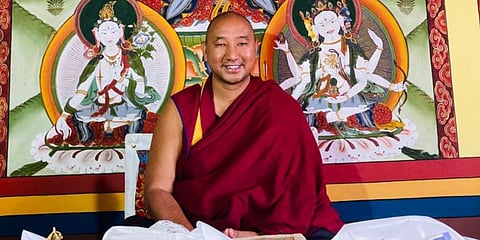

TAWANG: Debunking the Communist China's endeavour to select the successor of the 14th Dalai Lama, the head lama of the important Tawang Monastery said that China has no right to meddle with the process as China does not believe in religion.
Gyangbung Rinpoche, the Abbot (Head Lama) of the monastery during his interaction with a select group of journalists visiting Tawang Monastery, added that China is creating disputes along the Indian borders as it sees India as a challenge.
"China which does not believe in religion, has no right to interfere in the religious affairs of ours. China is searching for the successor of 14th Dalai Lama for which only the Dalai Lama has the right. China is trying to politicise this issue and wants to destroy our religion. In this regard, we want India’s support along with other world powers. For this the support of the Indian government is very important," Rinpoche said.
Tawang Monastery is the second most important monastery for the Tibetans, after the Potala Palace in Lhasa, Tibet, as the 6th Dalai Lama was born in Tawang which China has been claiming as the portion of Tibet.
The Tawang monastery is also known as Gaden Namgyal Lhatse in Tibetan meaning 'celestial paradise in a clear night' was founded by Merak Lama in 1680-1681 has its effect all over the world. China has adopted an incremental approach in increasing its influence over Tibet and the religious institutions there.
Calling the Chinese approach not good for it and for the world, Rinpoche said, “The right to find the 15th Dalai Lama is with the Dalai Lama, Tibetan and Himalayan people.” The first Dalai Lama, who is considered as the living reincarnate of Buddha was born in 1391.
The abbot praised India for its peaceful approach but said it may not work with China which wants to establish its supremacy. "China always tries to control the world, which is totally impossible in the 21st century. It wants to become the superpower in the world. To gain control in Asia, China sees India as a challenge so it wants to overpower India. This is the reason why it is creating unnecessary disputes in India's Arunachal Pradesh, Ladakh and Himachal Pradesh," he said.
He also asked India to take stern steps as and when required in dealing with China. "It is good that India wants to stay with peace and tranquillity with the neighbouring country but at the same time it should also harden its approach in dealing with China in such a scenario," he said.
There is ensuing tension between India and China since it moved its troops along the Line of Actual Control in Eastern Ladakh in May 2020. "India is a peace-loving country and I appreciate this. Even after tensions, India always talks of peace and tranquility across the globe. It is good that India wants to stay with peace and tranquility with the neighbouring country but at the same time it should also harden its approach in dealing with China in such a scenario," said Gyangbung Rinpoche.
Currently the Tibetan Government in exile is based out of Dharamshala and 14th Dalai Lama who escaped from China is also living there.
The Head Lama reiterated the old request of conferring the Dalai Lama with India's highest award Bharat Ratna. "He has grown up in India and wherever in the world he visits he always talks of India’s character of peace, prosperity, culture and religious beliefs,' he said.
India has been the birthplace of Buddhism. Lama praised India for its work towards promoting Buddhism. In November-December, a world-level seminar will be held on Buddhism at Nalanda. "I am happy that the government is taking up several projects for Buddhism," he said.
India's land borders or the LAC with China today are essentially those between India and Tibet. Besides a common border, parts of India share cultural linkages with Tibet.
Until the escape of the Dalai Lama in 1959, there was extensive trade and people-to-people contact between Tibet. One of the most sacred sites for Hindus - Mount Kailash and Lake Manasarovar - are in Tibet.